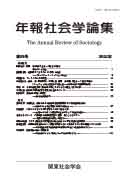Volume 2022, Issue 35
Displaying 1-14 of 14 articles from this issue
- |<
- <
- 1
- >
- >|
Special Issue
-
2022Volume 2022Issue 35 Pages 1-4
Published: August 26, 2022
Released on J-STAGE: August 30, 2023
Download PDF (224K) -
2022Volume 2022Issue 35 Pages 5-13
Published: August 26, 2022
Released on J-STAGE: August 30, 2023
Download PDF (316K) -
2022Volume 2022Issue 35 Pages 14-23
Published: August 26, 2022
Released on J-STAGE: August 30, 2023
Download PDF (352K) -
2022Volume 2022Issue 35 Pages 24-31
Published: August 26, 2022
Released on J-STAGE: August 30, 2023
Download PDF (357K) -
2022Volume 2022Issue 35 Pages 32-37
Published: August 26, 2022
Released on J-STAGE: August 30, 2023
Download PDF (325K) -
2022Volume 2022Issue 35 Pages 38-47
Published: August 26, 2022
Released on J-STAGE: August 30, 2023
Download PDF (1011K) -
2022Volume 2022Issue 35 Pages 48-56
Published: August 26, 2022
Released on J-STAGE: August 30, 2023
Download PDF (399K)
Articles
-
2022Volume 2022Issue 35 Pages 57-68
Published: August 26, 2022
Released on J-STAGE: August 30, 2023
Download PDF (463K) -
2022Volume 2022Issue 35 Pages 69-79
Published: August 26, 2022
Released on J-STAGE: August 30, 2023
Download PDF (412K) -
2022Volume 2022Issue 35 Pages 80-91
Published: August 26, 2022
Released on J-STAGE: August 30, 2023
Download PDF (386K) -
2022Volume 2022Issue 35 Pages 92-103
Published: August 26, 2022
Released on J-STAGE: August 30, 2023
Download PDF (404K) -
2022Volume 2022Issue 35 Pages 104-115
Published: August 26, 2022
Released on J-STAGE: August 30, 2023
Download PDF (398K) -
2022Volume 2022Issue 35 Pages 116-127
Published: August 26, 2022
Released on J-STAGE: August 30, 2023
Download PDF (479K)
-
2022Volume 2022Issue 35 Pages 141-142
Published: August 26, 2022
Released on J-STAGE: August 30, 2023
Download PDF (144K)
- |<
- <
- 1
- >
- >|
